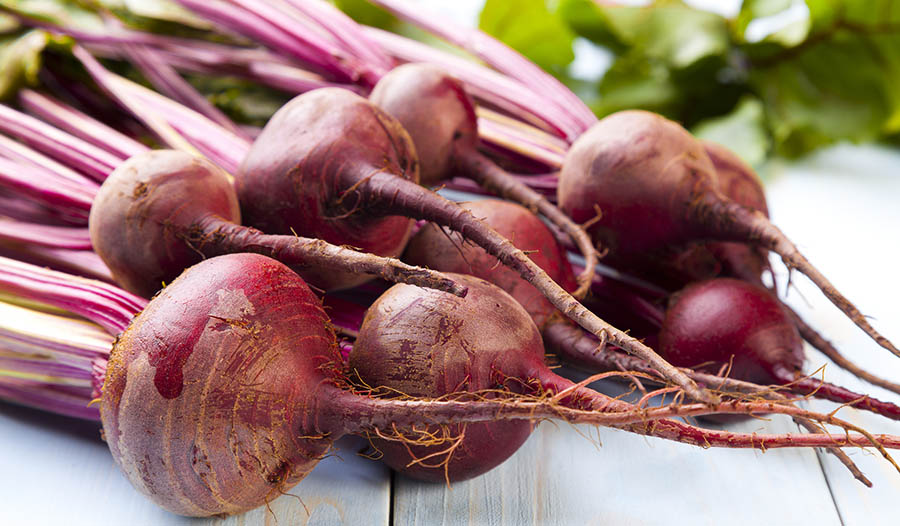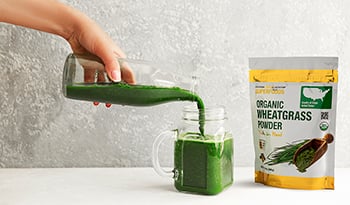Beetroot Powder: Benefits, Recommended Intake and Recipes

What Is Beetroot Powder Good For?
One of the most powerful superfoods is the beet. Both the leaves and root are packed full of nutrients and phytochemicals. And modern research has uncovered remarkable health benefits, including improving cardiovascular health, strength, and stamina with beetroot consumption.1
Beetroot powder has emerged as a fantastic way to capture all the nutritional and health benefits of beet juice in a convenient and tastier manner. The purple-crimson color of beetroot powder is due to betalains, which include betacyanin, the primary pigment of beets.
Betalains are also the key phytochemical components responsible for many of the health benefits of beetroots.2 Yet, the biggest focus of beetroot supplementation has been its nitrate compounds.3
As in beetroot juice, nitrates in beetroot powder ultimately increase nitric oxide production by cells lining blood vessels. Nitric oxide is very important in improving blood flow, lowering blood pressure, and preventing the formation of blood clots. By increasing nitric oxide levels, beetroot powder improves blood flow, reduces blood pressure and clot formation, and improves blood fluidity (the blood becomes less viscous and, therefore, flows through blood vessels more easily).
In addition to dietary nitrate, beetroot's betalain components also increase the activity of an enzyme, endogenous nitric oxide synthetase (eNOS), that boosts nitric oxide levels irrespective of the nitrate component. This action is a key antiaging effect of beetroot powder as eNOS activity declines as a person ages.
The potential antiaging effects of beetroot powder are seen in a double-blind study in older subjects (ages 65 to 79). Both a single and daily dosage for two weeks of beetroot increased muscle speed and power significantly.
Two weeks of supplementation increased maximal knee extensor speed (Vmax) by 7% and power (Pmax) by 9% higher than baseline measurements. The authors of the study concluded, "The magnitudes of these improvements are sufficient to offset the decline resulting from a decade or more of aging…."4
The Physiological Benefits Of Beetroot Powder
Beetroot powder can enhance human physiology or body processes via several key mechanisms, like beetroot juice. The nitric oxide-boosting action of beetroot is an important aspect of its ability to boost blood flow, improve athletic performance, and even lower blood pressure. But it is another example of a fundamental, underlying effect of beetroot in promoting overall health. It is well-established in clinical studies in humans that beetroot supplementation can improve blood flow dynamics.2,3
The ability to improve blood flow extends throughout the body, including the brain, heart, kidneys, skin, and erectile tissue. The point is that delivering more blood and oxygen to cells is ultimately what beetroot powder provides, which generally leads to improved function in all cells, tissues, and organs. Collectively improving blood flow to all body tissues, beetroot powder becomes a whole-body tonic that helps improve overall health.2,3,5
Beetroot powder exerts additional health benefits based on research on its key components. And while it can be added to the long list of natural products that exert direct antioxidant action, even more, important is beetroot powder's ability to influence cell signaling pathways that activate the body's antioxidant system. Specifically, betalains activate Nrf2 (nuclear factor-erythroid 2-related factor 2), the main regulator of the body's response to cellular damage and inflammation. Nrf2 is a master conductor of the expression of hundreds of genes that promote the formation of many antioxidant/detoxifying enzymes and compounds (e.g., glutathione). Betalains enhance the expression of these cellular protectors and rejuvenators. By increasing Nrf2, beetroot powder promotes health on a very deep cellular level.2,3,6
Betalains also activate SIRT1, one of the body's chief sirtuins. Molecules are made famous in scientific circles for slowing down aging and helping to address obesity, blood sugar control, cognitive decline, and many other age-related disorders. Resveratrol is the most well-known SIRT1 activator. But betalains work to activate SIRT1 through a much different mechanism and appear to affect the Sirtuin network in much more powerful ways than resveratrol.6 Researchers are just beginning to explore this exciting path.
Beetroot Powder Benefits For Blood Pressure
Many use beetroot powder for high blood pressure. Much of the blood pressure-lowering effects of beetroot are attributed to its nitrate component, which is converted by oral bacteria into nitrite and absorbed into the body. The nitrite is subsequently converted into nitric oxide by the cells that line blood vessels throughout the body. Beetroot nitrate ingestion promotes lowering blood pressure via improved dilation and reduced blood vessel stiffness, thereby reducing the force (pressure) exerted against the blood vessels as the blood pulses through.
Although there are other dietary sources of nitrates, beets are considerably more effective in raising blood nitrite levels than eating a very high intake of other nitrate-rich foods or taking a nitrate salt supplement. The level of nitrate in the diet has minimal impact on plasma nitrate and nitrite, but beet consumption can significantly increase plasma nitrate and nitrite throughout the day.3,7
Clinical evidence for the blood pressure-lowering effect of beetroot has been shown in over 100 human clinical trials. In one of the first studies looking at beetroot powder and blood pressure, researchers at The London School of Medicine showed that drinking 16 ounces of fresh beet juice a day significantly reduced systolic (top number) and diastolic (bottom number) up to 10 mm Hg in healthy subjects.8 Beetroot lowered blood pressure within an hour, with a peak drop occurring 3 to 4 hours after ingestion. The peak time of reduction in blood pressure correlated with the appearance and peak levels of nitrite.
Since this initial study in 2008, over 100 additional clinical studies have evaluated the blood pressure-lowering effect of beetroot.9,10 The overall effect from pooled data in sufficient duration and dosage studies shows a more modest drop of 5 mm Hg of both the systolic and diastolic blood pressure. And while not a huge drop, this level of blood pressure reduction would cut the rate of strokes and heart attacks by about 10%. In terms of lives, that would mean about 1.5 million lives being saved each year.
In most of the studies with beetroot, the nitrate level in the product or the subject's blood was the key factor of effectiveness. The blood pressure lowering effect usually takes about two weeks as a single dose has a negligible effect. The blood pressure-lowering effect of beetroot is enhanced if people are engaged in regular moderate-intensity aerobic exercise.11
There is some variation in the response to the blood pressure-lowering effects of beetroot, with advanced age and genetics being a key factor because of less activity (aging) or less expression (genetics) for eNOS. This enzyme converts nitrite to nitric oxide.12 Another cause of reduced effectiveness is insufficient oral or gut microorganisms that convert nitrate to nitrite.
And while the blood pressure-lowering effect of beetroot powder is important, the most consistent clinical finding of beetroot is in improving the function of the blood vessel lining, leading to improved blood flow. This action may be more important in the ability of beetroot powder to promote cardiovascular health.
Benefits Of Beetroot Powder For Exercise Performance + Recovery
There has been considerable scientific investigation on the effects of beetroot powder on exercise, muscle strength and stamina, and post-exercise recovery. A recent detailed systematic review of all clinical research in these applications concluded that beetroot supplementation was most effective for increasing exercise performance for those activities lasting between 2 to 10 minutes, and best results seem to be achieved when the beetroot supplementation was given at least 2.5 hours before exercise. It was also concluded that the use of an antiseptic mouthwash, or anything else that disrupts the oral microbiome, will disrupt the conversion of beetroot nitrates into nitrites to reduce the effectiveness of beetroot production with potential negative impacts on cardiovascular health and exercise performance. May decrease the effect of nitrate.
Beetroot powder can also enhance overall physical performance and heart functioning during exercise. For example, in a 2009 study, 12 male cyclists ingested 140 ml/day of concentrated beet or a placebo for 6 days. They were then crossed over to the other drink after a 14-day washout period.15 After supplementation on Day 6, subjects performed 60 minutes of submaximal cycling, followed by a 10-km time trial. Time-trial performance (953 vs. 965 seconds) and power output (294 vs. 288 watts) improved after the real beet compared with the placebo. In submaximal cycling, the use of oxygen (VO₂) was also lower with the real beet ingestion. What does all this data mean? In short, beetroot powder promotes increased physical stamina and performance. In athletic competitions, that may mean the difference between winning or losing.
Beetroot is particularly helpful in enhancing high-intensity exercise performance that involves explosive movements lasting less than 6 seconds like weightlifting or sprinting. Results from a systematic review showed that in 4 of the 10 sprint-type studies, beetroot supplementation improved sprint time and power output. In the weightlifting studies, 4 of the 10 studies showed improvements in the power and velocity of free-weight and isokinetic exercises.16
Beetroot may also boost exercise-related recovery and help with quicker recovery of strength and a reduction in post-exercise pain, inflammation, and muscle damage. Beetroot also prevents exercise-induced muscle damage (EIMD) according to a meta-analysis of six double-blind, controlled studies. EIMD results in decreased muscle strength, increased muscle soreness and swelling, and markers of inflammation in the blood. Pooled results showed that subjects consuming beetroot powder before accelerated isometric strength recovery 72 hours after exercise increased the pressure pain threshold within 48 hours.17,18
Recommended Intake For Beetroot Powder
Since the active components of beetroot are heat sensitive, the best beetroot powders are produced without high heat. In this regard, beetroot powders that utilize the INFIDRI™ process stand above the rest. First, it is a beetroot powder designed to supply all the key components that clinical research has validated. Many beetroot powders on the market are ground-up beetroots that are dried in drums or spray-dried with high heat. The INFIDRI™ process is a gentle drying technology that utilizes targeted wavelengths of infrared light that remove water from beetroot without damaging the fragile beneficial compounds.
With dozens of positive human clinical studies with beetroot, there is some evidence for dosage levels needed to improve cardiovascular health, physical strength and tolerance, and recovery from exercise using beetroot powder. Most studies used daily dosages of beetroot between 70 and 250 ml, and the best results were seen when taking at least 140 ml of beetroot for more than 14 days. The dosage for beetroot powder should approximate this level. There is variation in quality in beetroot powders, and dosage will vary accordingly.
For a high-quality beetroot powder, such as California Gold's Organic Beetroot powder, 10 g (one tablespoon) is approximately equal to 100 ml of beetroot.
To simplify daily intake recommendations when using beetroot powder, for general health one tablespoon per day is sufficient, but for supporting blood pressure control and other targeted indications, a higher dosage of two tablespoons (20 grams) is recommended.
Side Effects
Beetroot powder is generally well-tolerated, and no side effects are seen at recommended intake levels. However, consuming beetroot powder, beets, or beet juice will often cause dark red or black-colored stools and red-tinted urine. Do not be alarmed. It is simply the red pigments in beetroot. It is a normal occurrence.
Easy Beetroot Powder Recipes
There are many ways to add beetroot powder to a person's diet if they want to enjoy all the great health benefits. Remember that mixing beetroot powder is a great way to add a little sweetness and more depth of flavor to all sorts of sweet and savory meals. Here are a few recipes with beetroot powder to get you started.
Beet and Berry Smoothie Recipe
Ingredients:
- 1 cup coconut water
- 1 Tbs. beetroot powder
- Handful of fresh berries
- 2 medjool dates
- 2 Tbs. shredded coconut
- ½ tsp. vanilla extract
- Ice cubes
Instructions:
- Add all the ingredients to a blender. Turn the blender on medium or high until the frozen drink has a smooth texture and all ingredients are pulverized. And serve!
Gluten-Free Beet and Berries Overnight Oat Recipe
Ingredients:
- 1 Tbs. beetroot powder
- 1/4 cup fresh berries
- 1 cup rolled oats
- 1 1/2 cups almond or soy milk
- 1 tsp. coconut oil
- 1/4 tsp. cinnamon
- Maple syrup to taste
Instructions:
- Use a food processor to puree cranberries.
- Mix together all of the ingredients besides syrup in an airtight jar.
- Refrigerate the mixture overnight or for at least eight hours.
- Pour the mixture into a bowl to serve and sweeten with the desired amount of maple syrup. Enjoy!
Dairy-Free Beet Cookie Recipe
Ingredients:
- 1 egg
- 1/4 cup brown sugar
- 1/2 cup peanut butter
- 1 Tbs. beetroot powder
- 2 Tbs. tapioca flour
- 1 tsp. vanilla extract
- 1/4 cup chocolate chips
Instructions:
- Preheat the oven to 375 degrees Fahrenheit and grease a cookie sheet lightly.
- Mix together egg, brown sugar and peanut butter in a medium-sized bowl.
- Add the beetroot powder, vanilla, and tapioca flour to the bowl and mix thoroughly until fully incorporated.
- Use a spoon to gently fold in chocolate chips.
Divide the mixture into 10 even balls.
- Gently flatten the balls onto the baking sheet.
- Bake for 10 minutes and let cool before eating.
References:
- Chen L, Zhu Y, Hu Z, Wu S, Jin C. Beetroot as a functional food with huge health benefits: Antioxidant, antitumor, physical function, and chronic metabolomics activity. Food Sci Nutr. 2021 Sep 9;9(11):6406-6420.
- Hadipour E, Taleghani A, Tayarani-Najaran N, Tayarani-Najaran Z. Biological effects of red beetroot and betalains: A review. Phytother Res. 2020 Aug;34(8):1847-1867.
- Milton-Laskibar I, Martínez JA, Portillo MP. Current Knowledge on Beetroot Bioactive Compounds: Role of Nitrate and Betalains in Health and Disease. Foods. 2021 Jun 7;10(6):1314.
- Zoughaib WS, Hoffman RL, Yates BA, Moorthi RN, Lim K, Coggan AR. Short-term beetroot juice supplementation improves muscle speed and power but does not reduce blood pressure or oxidative stress in 65-79 y old men and women. Nitric Oxide. 2023 May 25;138-139:34-41.
- Fujii N, Omori S, Kataoka Y, Maimaituxun G, Bailey SJ, Lloyd AB, Arnold JT, Amano T, Tanabe Y, Omi N, Watanabe K, Nishiyasu T. Dietary nitrate supplementation increases nitrate and nitrite concentrations in human skin interstitial fluid. Nitric Oxide. 2023 May 1;134-135:10-16.
- Phukan BC, Roy R, Paul R, Mazumder MK, Nath J, Bhattacharya P, Borah A. Traversing through the cell signaling pathways of neuroprotection by betanin: therapeutic relevance to Alzheimer's Disease and Parkinson's Disease. Metab Brain Dis. 2023 Mar;38(3):805-817.
- Miller GD, Marsh AP, Dove RW, et al. Plasma nitrate and nitrite are increased by a high-nitrate supplement but not by high-nitrate foods in older adults. Nutr Res. 2012 Mar;32(3):160-8.
- Webb AJ, Patel N, Loukogeorgakis S, Okorie M, et al. Acute blood pressure lowering, vasoprotective, and antiplatelet properties of dietary nitrate via bioconversion to nitrite. Hypertension. 2008 Mar;51(3):784-90.
- Bahadoran Z, Mirmiran P, Kabir A, Azizi F, Ghasemi A. The Nitrate-Independent Blood Pressure-Lowering Effect of Beetroot Juice: A Systematic Review and Meta-Analysis. Adv Nutr. 2017 Nov 15;8(6):830-838.
- Bahrami LS, Arabi SM, Feizy Z, Rezvani R. The effect of beetroot inorganic nitrate supplementation on cardiovascular risk factors: A systematic review and meta-regression of randomized controlled trials. Nitric Oxide. 2021 Oct 1;115:8-22.
- de Lima Bezerra ÁD, Costa EC, Pacheco DA, et al. Effect of Acute Dietary Nitrate Supplementation on the Post-Exercise Ambulatory Blood Pressure in Obese Males: A Randomized, Controlled, Crossover Trial. J Sports Sci Med. 2019 Feb 11;18(1):118-127.
- Siervo M, Lara J, Jajja A, Sutyarjoko A, et al. Ageing modifies the effects of beetroot juice supplementation on 24-hour blood pressure variability: An individual participant meta-analysis. Nitric Oxide. 2015 May 1;47:97-105.
- Silva KVC, Costa BD, Gomes AC, Saunders B, Mota JF. Factors that Moderate the Effect of Nitrate Ingestion on Exercise Performance in Adults: A Systematic Review with Meta-Analyses and Meta-Regressions. Adv Nutr. 2022 Oct 2;13(5):1866-1881.
- Evangelista JF, Meirelles CM, Aguiar GS, Alves R, Matsuura C. Effects of Beetroot-Based Supplements on Muscular Endurance and Strength in Healthy Male Individuals: A Systematic Review and Meta-Analysis. J Am Nutr Assoc. 2023 May 11:1-15.
- Cermak NM, Gibala MJ, van Loon LJ. Nitrate supplementation's improvement of 10-km time-trial performance in trained cyclists. Int J Sport Nutr Exerc Metab. 2012 Feb;22(1):64-71.
- Tan R, Cano L, Lago-Rodríguez Á, Domínguez R. The Effects of Dietary Nitrate Supplementation on Explosive Exercise Performance: A Systematic Review. Int J Environ Res Public Health. 2022 Jan 11;19(2):762.
- Gamonales JM, Rojas-Valverde D, Muñoz-Jiménez J, Serrano-Moreno W, Ibáñez SJ. Effectiveness of Nitrate Intake on Recovery from Exercise-Related Fatigue: A Systematic Review. Int J Environ Res Public Health. 2022 Sep 23;19(19):12021.
- Jones L, Bailey SJ, Rowland SN, et al. The Effect of Nitrate-Rich Beetroot Juice on Markers of Exercise-Induced Muscle Damage: A Systematic Review and Meta-Analysis of Human Intervention Trials. J Diet Suppl. 2022;19(6):749-771.
DISCLAIMER:This Wellness Hub does not intend to provide diagnosis...















































































 Table of Contents
Table of Contents
















